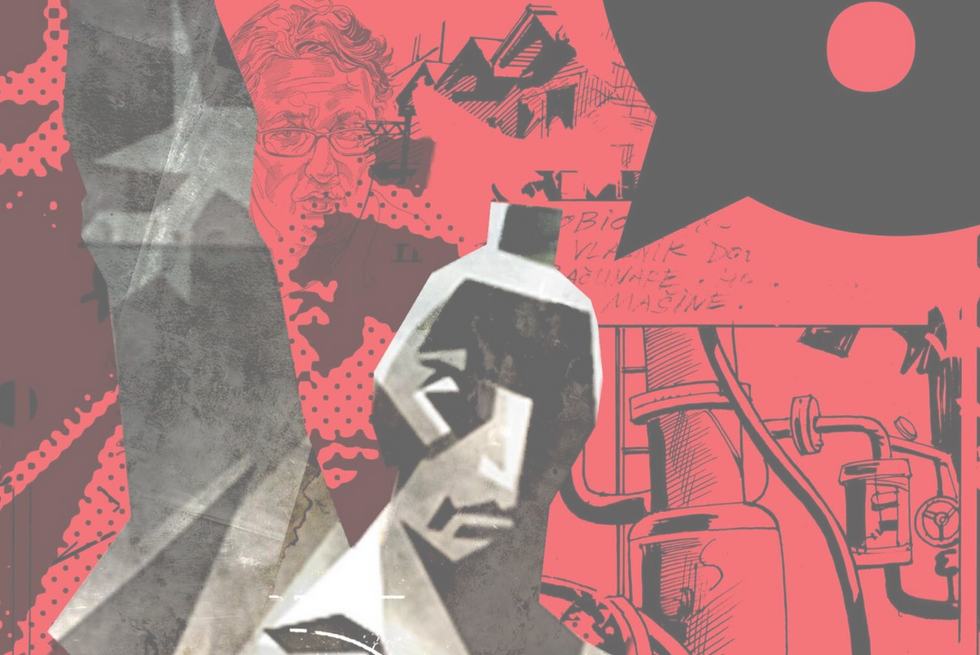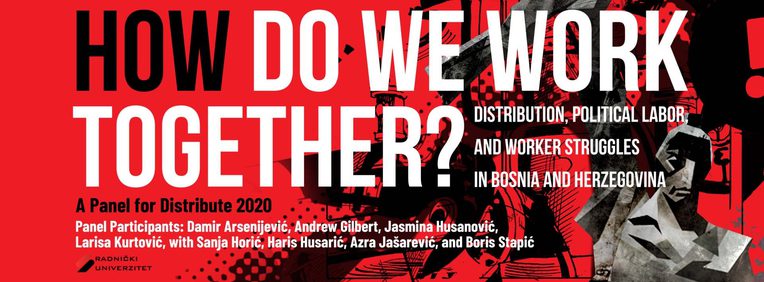How Do We Work Together? Distribution, Political Labor, and Worker Struggles in Bosnia-Herzegovina
From the Series: Distribute2020: An Invitation to Use, Reuse, Recombine, Cite, Relate, and Teach!
From the Series: Distribute2020: An Invitation to Use, Reuse, Recombine, Cite, Relate, and Teach!

This post offers additional materials to complement the panel, “How Do We Work Together? Distribution, Political Labor, and Worker Struggles in Bosnia and Herzegovina · ¿Cómo trabajamos juntos? Distribución, trabajo político y luchas obreras en Bosnia-Herzegovina,” presented at Distribute2020, the biannual multimodal conference presented by the Society for Cultural Anthropology (SCA) and the Society for Visual Anthropology (SVA) in May of 2020.
We imagine that “How Do We Work Together?” could be featured in classes on ethnography (as a form of research practice and research communication), multimodal and visual anthropology, and political anthropology. Our unique form of collaboration would be of particular interest to instructors who are looking to showcase new and experimental forms of ethnographic fieldwork that move beyond the figure of the lone ethnographer. What’s more, the accent our panel places on engaged forms of research that involve working with activists, and politically engaged academics and artists, dovetails with the ongoing efforts to decolonize anthropological practices of producing and disseminating ethnographic knowledge. Indeed, part of our aim in this panel is to highlight ways of forging new and different kinds of relationships with our interlocutors and collaborators in the field, and of producing knowledge that reflects their concerns and has value to them. Next, our use of audio, video, and photography, as well as our larger collaborative graphic ethnography project, makes our panel a good fit for those teaching courses in visual and multimodal ethnography. Graphic representation is one of the more novel forms of recent experimental ethnography, and it opens up a range of new possibilities for making research more accessible to a range of nonacademic audiences. Lastly, given its focus on protest movements and labor-based struggle, this panel will enrich courses focused on the anthropological study of politics, whether those courses explore activism or postsocialist transformation at large.
The readings and supplemental materials we offer below have been chosen because they pair well with our panel in exploring the three issue areas outlined above. Maple Rasza’s (2015) book, Bastards of Utopia, is not only an excellent example of an anthropology of activism and of militant research, but it is also an innovative ethnography of the political landscape being forged after the fall of socialism. Similarly, Yarimar Bonilla’s (2015) ethnography Non-Sovereign Futures, Sian Lazar’s (2018) article on Argentinian labor unions, and the documentary film The Take (Lewis and Klein 2004) about worker occupied factory in Buenos Aires, offer a broad view of struggles that originate within labor unions—similar to the story of the Bosnian detergent factory “Dita” which is the focus of our ongoing work. The aforementioned documentary film, along with Maple Razsa’s and Milton Guillén’s (2017) collaborative and interactive film, The Maribor Uprisings, are great companion pieces in courses on visual and multimodal anthropology, as is Newman’s (1998) article (one of the earliest experiments in graphic ethnography) and the website of the Institute of Radical Imagination. The latter is a unique experimental project involving anthropologists, artists, activists, cultural producers, and hackers who are brought together by an interest in militant research and radical pedagogy. For those looking to explore collaboration as part of a larger conversation on the evolution of research and ethnographic methods, we recommend the article by Kim Fortun and Todd Chekarsky (1998), as well as the article by the Matsutake Worlds Research Group (2009). And last but not least, we highlight Decolonizing Ethnography (2019) by Carolina Alonso Bejarano et al. as a work that not only enacts a collaborative ethos, but also shows how such forms of co-laboring can also help decolonize ethnographic practice and open up new and more desirable futures for our discipline.
(We also have recommendations for anyone with an area-studies focus on Bosnia and Herzegovina and the themes we raise in our panel, as well as examples of other work by panel participants. Feel free to email us at andrew.gilbert@pm.me or larisa.kurtovic@gmail.com.)
Bejarano, Carolina Alonso, Lucia López Juárez, Mirian A. Mijangos García, and Daniel M. Goldstein. 2019. Decolonizing Ethnography: Undocumented Immigrants and New Directions in Social Science. Durham, N.C.: Duke University Press.
Bonilla, Yarimar. 2015. Non-Sovereign Futures: French Caribbean Politics in the Wake of Disenchantment. Chicago: University of Chicago Press.
Fortun, Kim, and Todd Cherkasky. 1998. “Counter-Expertise and the Politics of Collaboration.” Science as Culture 7, no. 2: 145–72.
Institute of Radical Imagination: https://instituteofradicalimagination.org
Lazar, Sian. 2018. “A ‘Kinship Anthropology of Politics’? Interest, the Collective Self, and Kinship in Argentine Unions.” Journal of the Royal Anthropological Institute 24: 256–74.
Lewis, Avi, and Naomi Klein. 2004. The Take (film). Directed and produced by Avi Lewis and Naomi Klein. 87 Minutes.
Matsutake Worlds Research Group. 2009. “A New Form of Collaboration in Cultural Anthropology: Matsutake Worlds.” American Ethnologist 36, no. 2: 380–403.
Newman, Deena. 1998. “Prophecies, Police Reports, Cartoons and Other Ethnographic Rumors in Addis Ababa.” Etnofoor 11, no. 2: 83–110.
Rasza, Maple. 2015. Bastards of Utopia: Living Radical Politics after Socialism. Bloomington: Indiana University Press.
Rasza, Maple, and Milton Guillén. 2017. The Maribor Uprisings (interactive film). Produced by Maples Rasza. Directed by Maple Razsa and Miton Guilleén.
We see points of intersection between our panel and others. For example, like our panel, “For an Anthropology of Fascism” is explicitly interested in using ethnographic and anthropological research and analysis to respond to the political demands of the moment, and in exploring ways to creatively and effectively distribute diverse forms of resistance to (fascist) political threats.
Also like our panel, “‘Until Dignity Becomes a Habit’: The Awakening of Chile” offers analysis created from both the observation and participation in popular struggle, including open revolt and experimental forms of democratic decision making, as well as considerations of various forms of intervention into that struggle.
Finally, our panel and the collaborative research and political relationships that it both represents and enacts find parallels with some of the participants of the “Narco-aesthetics” panel, as well as the remarkable keynote by Miyarrka Media, “Making Worlds Otherwise.”
